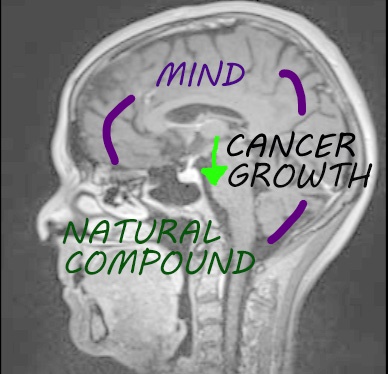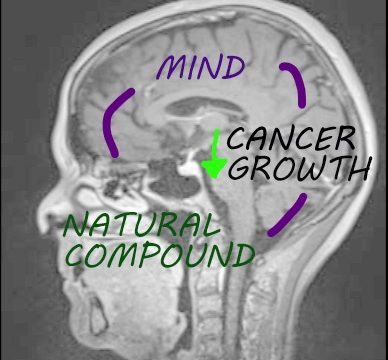Throughout much of human evolution, it is likely that large amounts of plant foods were consumed. In addition to being rich in both plant protein and fibre, our ancestors’ diets were also rich in phytosterols — plant-derived compounds that are structurally very similar to cholesterol. We can use these to combat cancer.
Phytosterols (aka plant sterols) are found in a variety of edible plants, with a long history of use in humans. Phytosterols can affect several biological processes through neuroprotective, antioxidative and anticancer activity. An example of this type of phytosterol is the natural compound, β -sitosterol. This is the most abundant plant sterol in the human diet.
Mind and Cancer
The mind and body are interrelated at the axis of cancer. For instance, generalized anxiety disorder (GAD) is one of the most common anxiety disorders. People suffering this disorder experience excess worrying, sleep disturbance, muscle tension and are easily fatigued. A study1 found people with this diagnosis have a higher overall cancer risk, in particular the risk of lung and prostate cancer in male patients with GAD. Excess stress levels can increase inflammation and can also decrease the immune response against cancer. Feeling stressed can lower how well immunotherapy and chemotherapy treatments work in the body2.
Mind and β sitosterol
Results from a recent study3 in mice suggest the natural compound b-sitosterol has a significant protective effect on anxiety and stress-related conditions. The researchers conclude β-sitosterol may be repositioned as a standalone therapeutic or in a synergic combination with the antidepressant drugs of type; selective serotonin reuptake inhibitor class, such as fluoxetine. Lowering excessive anxiety and stress levels helps your immune system and lowers inflammation thus suppressing some of the pathways that cancers use to thrive.
Cancer and β-sitosterol
The natural plant phytosterol β-sitosterol induces anti-proliferation and apoptosis (programmed cell death) in human leukemic cells and4. β-sitosterol has also been shown to induce apoptosis in studies of colon5, breast6 and prostate cancers7 and have anticancer properties against lung cancer, stomach cancer, ovarian cancer8.
- Breast cancer
- Colon cancer
- Leukemia
- Lung cancer
- Ovarian cancer
- Prostate cancer
- Stomach cancer
Biochemical Pathways of β-Sitosterol
- It is thought that β-Sitosterol may act against prostate cancer through modulation of 17β–HSD4 activity9. 17β-HSD4 is a protein involved in fatty acid β-oxidation and steroid metabolism (specifically estrone to estradiol).
- A molecular mechanism of action of β-Sitosterol is as a tubulin-binding anticancer agent10. (Tubulin is the protein that forms long chains or filaments that form microtubules, hollow fibers which serve as a skeletal system for living cells. Microtubules have the ability to shift through various formations which is what enables a cell to undergo mitosis or to regulate intracellular transport).
- β-sitosterol ameliorates colitis via the NF-κB pathway11.
- An equivalent pharmaceutical compound, drug Simvastatin, is a statin that lowers cholesterol levels and induces inhibition of TNBC cells via PI3K pathway activation12.
Sources of β-sitosterol
A study evaluated peanuts and their products as a source of phytosterols, especially β-sitosterol 13 The data suggest that peanuts and its products, such as peanut oil, peanut butter, and peanut flour, are good sources of β-sitosterol.

Resveratrol is a natural compound that is found to be synergistic in combination with β-sitosterol in a study of prostate cancer 7.
Beta-sitosterol is found in rice bran, wheat germ, peanuts, pomegranate, corn oils, avocados, and soybeans. High levels are also found in botanicals such as saw palmetto, rye grass pollen, pygeum, and stinging nettles. It is also found in many vegetables, nuts, and oils.
Beta-sitosterol is available as a natural compound in supplement form and is referred to as a plant sterol.
Safety – Possible Side Effects
According to verywellheath.com based on their Medical Review Board of which is comprised of a “team of board-certified doctors who ensure our content is medically accurate and reflects the latest in health information”,
“Beta-sitosterol is considered safe when used at the recommended doses for up to six months. Side effects may include nausea, indigestion, bloating, diarrhea, and constipation. Less commonly, beta-sitosterol has been linked to erectile dysfunction and low libido.
Beta-sitosterol should not be used in people with a rare genetic disorder known as sitosterolemia in which beta-sitosterol and other fats accumulate abnormally in the blood. Taking a beta-sitosterol supplement under such conditions may actually increase the risk of a heart attack.
Beta-sitosterol may interact with Pravachol (pravastatin) and Zetia (ezetimibe), both of which are used to lower blood cholesterol levels. Taking either these drugs can reduce the effectiveness of beta-sitosterol.
Due to the lack of safety research, beta-sitosterol should not be used in children, pregnant women, or nursing mothers. To avoid unforeseen side effects or interactions, speak with your doctor before taking a beta-sitosterol supplement.”
Take home message
- Consuming the natural compound β-sitosterol is an option to regulate your internal biochemical pathways against cancer as it acts as an anticancer agent in two synergistic ways. Firstly, by lowering stress levels and secondly, by potentially killing cancer tumour cells.
Supporting Studies
1. Shen C-C, Hu Y-W, Hu L-Y, et al. The risk of cancer in patients with generalized anxiety disorder: a nationwide population-based study. PLoS One. 2013;8(2):e57399-e57399.
2. Nissen MD, Sloan EK, Mattarollo SR. β-Adrenergic Signaling Impairs Antitumor CD8 T-cell Responses to B-cell Lymphoma Immunotherapy. Cancer Immunology Research. 2018;6(1):98-109.
3. Panayotis N, Freund PA, Marvaldi L, et al. β-sitosterol reduces anxiety and synergizes with established anxiolytic drugs in mice. Cell Reports Medicine. 2021;2(5):100281.
4. Park C, Moon D-O, Rhu C-H, et al. β-Sitosterol Induces Anti-proliferation and Apoptosis in Human Leukemic U937 Cells through Activation of Caspase-3 and Induction of Bax/Bcl-2 Ratio. Biol Pharm Bull. 2007;30(7):1317-1323.
5. Raicht RF, Cohen BI, Fazzini EP, Sarwal AN, Takahashi M. Protective effect of plant sterols against chemically induced colon tumors in rats. Cancer Res. 1980;40(2):403-405.
6. Awad AB, Williams H, Fink CS. Phytosterols reduce in vitro metastatic ability of MDA-MB-231 human breast cancer cells. Nutr Cancer. 2001;40(2):157-164.
7. Awad AB, Burr AT, Fink CS. Effect of resveratrol and beta-sitosterol in combination on reactive oxygen species and prostaglandin release by PC-3 cells. Prostaglandins Leukot Essent Fatty Acids. 2005;72(3):219-226.
8. Bin Sayeed MS, Ameen SS. Beta-Sitosterol: A Promising but Orphan Nutraceutical to Fight Against Cancer. Nutr Cancer. 2015;67(8):1216-1222.
9. Lomenick B, Shi H, Huang J, Chen C. Identification and characterization of β-sitosterol target proteins. Bioorg Med Chem Lett. 2015;25(21):4976-4979.
10. Mahaddalkar T, Suri C, Naik PK, Lopus M. Biochemical characterization and molecular dynamic simulation of β-sitosterol as a tubulin-binding anticancer agent. Eur J Pharmacol. 2015;760:154-162.
11. Kim KA, Lee IA, Gu W, Hyam SR, Kim DH. β-Sitosterol attenuates high-fat diet-induced intestinal inflammation in mice by inhibiting the binding of lipopolysaccharide to toll-like receptor 4 in the NF-κB pathway. Mol Nutr Food Res. 2014;58(5):963-972.
12. Park YH, Jung HH, Ahn JS, Im YH. Statin induces inhibition of triple negative breast cancer (TNBC) cells via PI3K pathway. Biochem Biophys Res Commun. 2013;439(2):275-279.
13. Awad AB, Chan KC, Downie AC, Fink CS. Peanuts as a Source of β-Sitosterol, a Sterol With Anticancer Properties. Nutr Cancer. 2000;36(2):238-241.
To read more about Targeting Cancer with the mind CLICK HERE
To read more about how you can learn my methods of Targeting Cancer with Natural Compounds CLICK HERE

